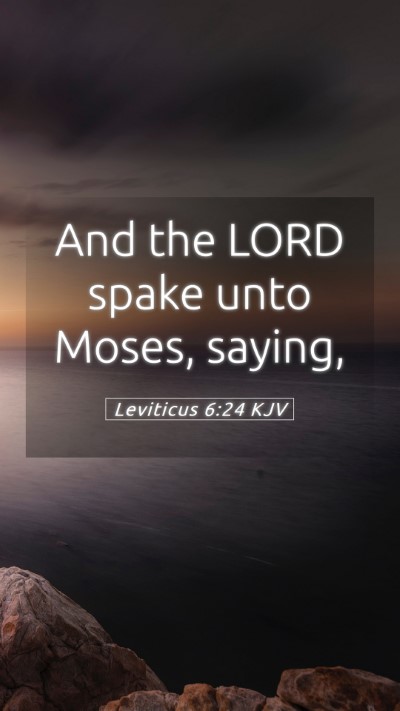Understanding Leviticus 6:24
Bible Verse: Leviticus 6:24
“And the Lord spake unto Moses, saying,”
Summary of Leviticus 6:24
This passage introduces a divine message given to Moses, focusing on the offerings to God. It highlights the significance of the sacrificial system as laid out in the Levitical laws, demonstrating how God desires to maintain a relationship with His people through prescribed rituals.
Bible Verse Meanings and Interpretations
The interpretations of Leviticus 6:24 vary among scholars, but several common themes emerge:
-
Divine Instruction: The phrase "the Lord spake unto Moses" signifies the direct communication between God and His chosen leader, emphasizing the importance of listening to and obeying divine commands.
-
Importance of Offerings: Leviticus 6 outlines the nature of offerings required in worship, establishing the foundational principles of sacrifice that are integral to Israelite worship and foreshadowing the ultimate sacrifice of Jesus Christ.
-
Holiness and Reverence: The instructions provided are to promote holiness and reverence towards God, reflecting the need for purity in worship. This implies a deeper meaning of accountability and sincere devotion in spiritual practices.
Bible Verse Commentary
The commentaries by Matthew Henry, Albert Barnes, and Adam Clarke offer valuable insights into the implications of this verse:
-
Matthew Henry: He emphasizes that God speaks to us through His word, and this verse reminds us of our duty to adhere to God’s instructions concerning worship and sacrifice. Sacrifice symbolizes atonement and signifies gratitude towards God.
-
Albert Barnes: Barnes discusses the covenant relationship between God and Israel, explaining that these laws serve a purpose in maintaining order and holiness among God’s people. He points out that neglecting these rituals leads to spiritual decline.
-
Adam Clarke: Clarke focuses on the significance of understanding the historical context of the sacrificial laws. He acknowledges that these rituals prepared the way for a greater revelation of God through Christ, making the sacrificial system essential for deeper spiritual understanding.
In-Depth Bible Verse Analysis
The analysis enriches our understanding of this scripture:
-
Historical Context: Understanding the culture of ancient Israel provides insight into how these laws distinguished them from surrounding nations, giving them a unique identity focused on holiness.
-
The Role of the Priest: The chapter underscores the priest’s role in mediating between God and the people, showcasing the necessity of leadership in the worship process.
Applying Bible Verses to Daily Life
The lessons from Leviticus 6:24 can be applied to modern spirituality:
- Listening to God: Just as Moses received instructions, believers today should seek to understand and apply God’s will in their lives through prayer and scripture study.
- Value of Sacrifice: The concept of sacrifice persists in contemporary faith practices, suggesting that true devotion often requires personal sacrifice and commitment.
- Community and Worship: The communal aspect of worship in the Old Testament serves as a model for modern gatherings where believers can support one another in their faith journeys.
Additional Bible Cross References
- Exodus 29:18 - Discusses burnt offerings and their significance.
- Leviticus 1:3-4 - Outlines the procedure for offerings.
- Hebrews 10:1-4 - Comments on the fulfillment of the sacrificial system in Christ.


